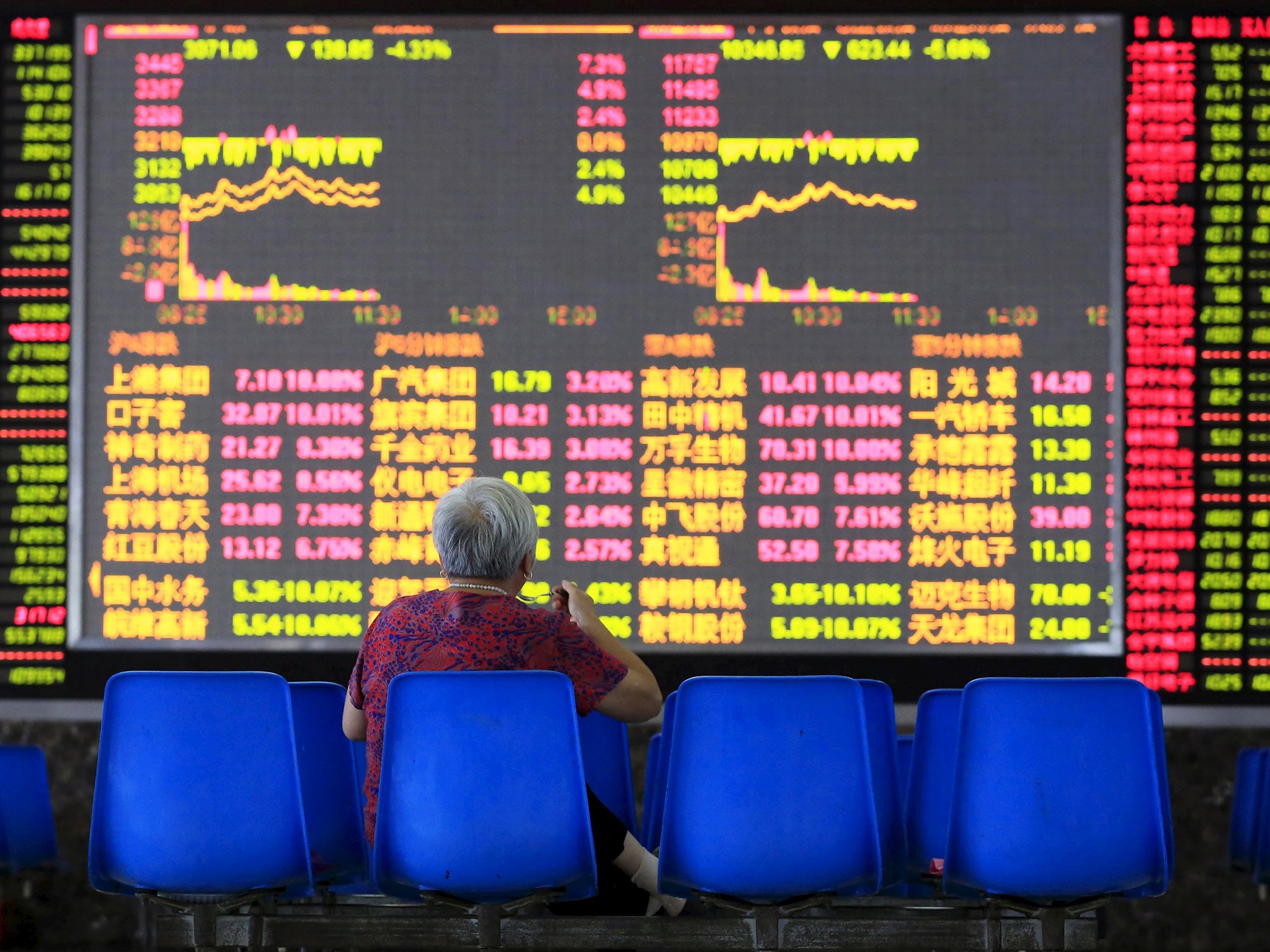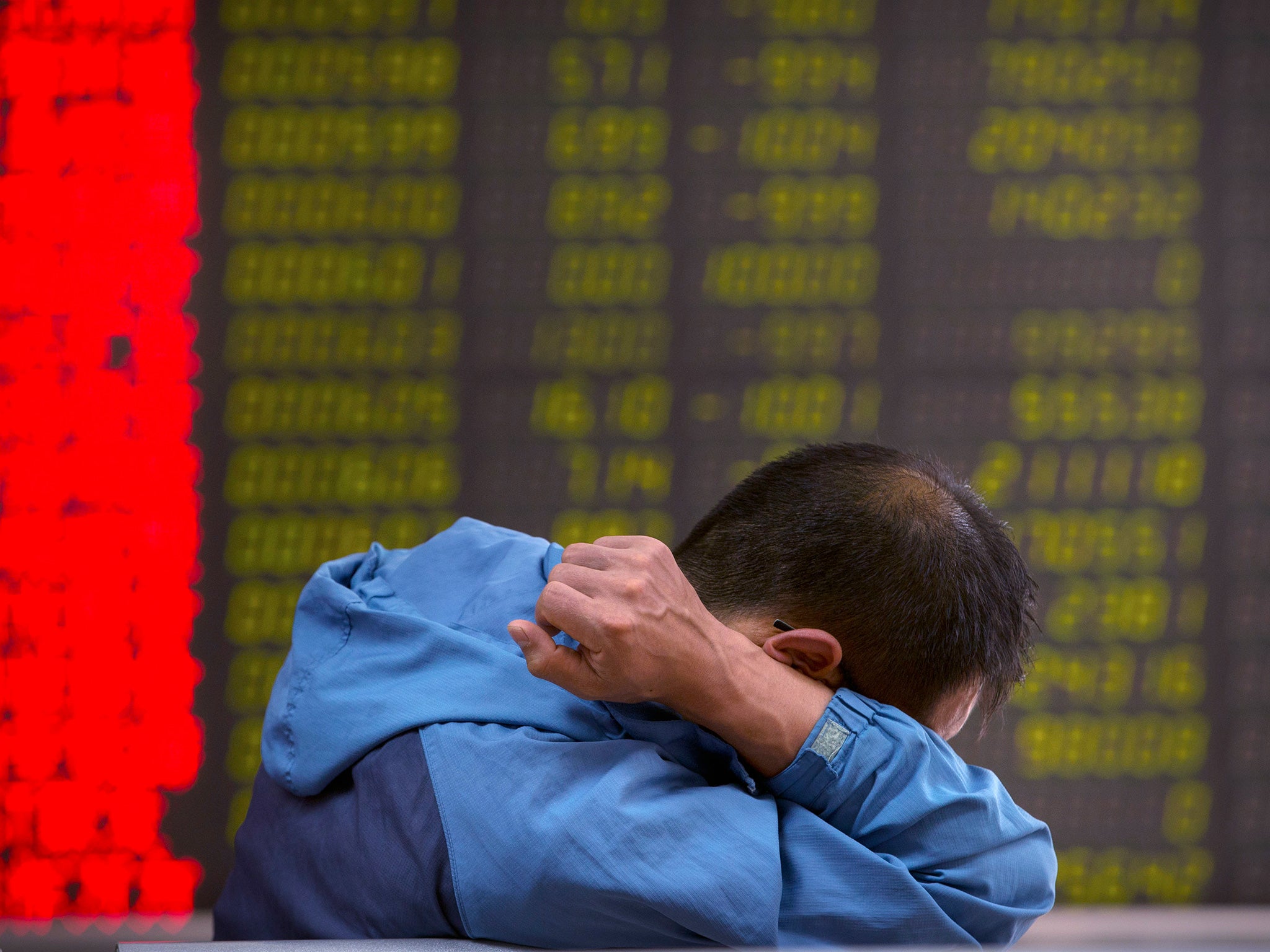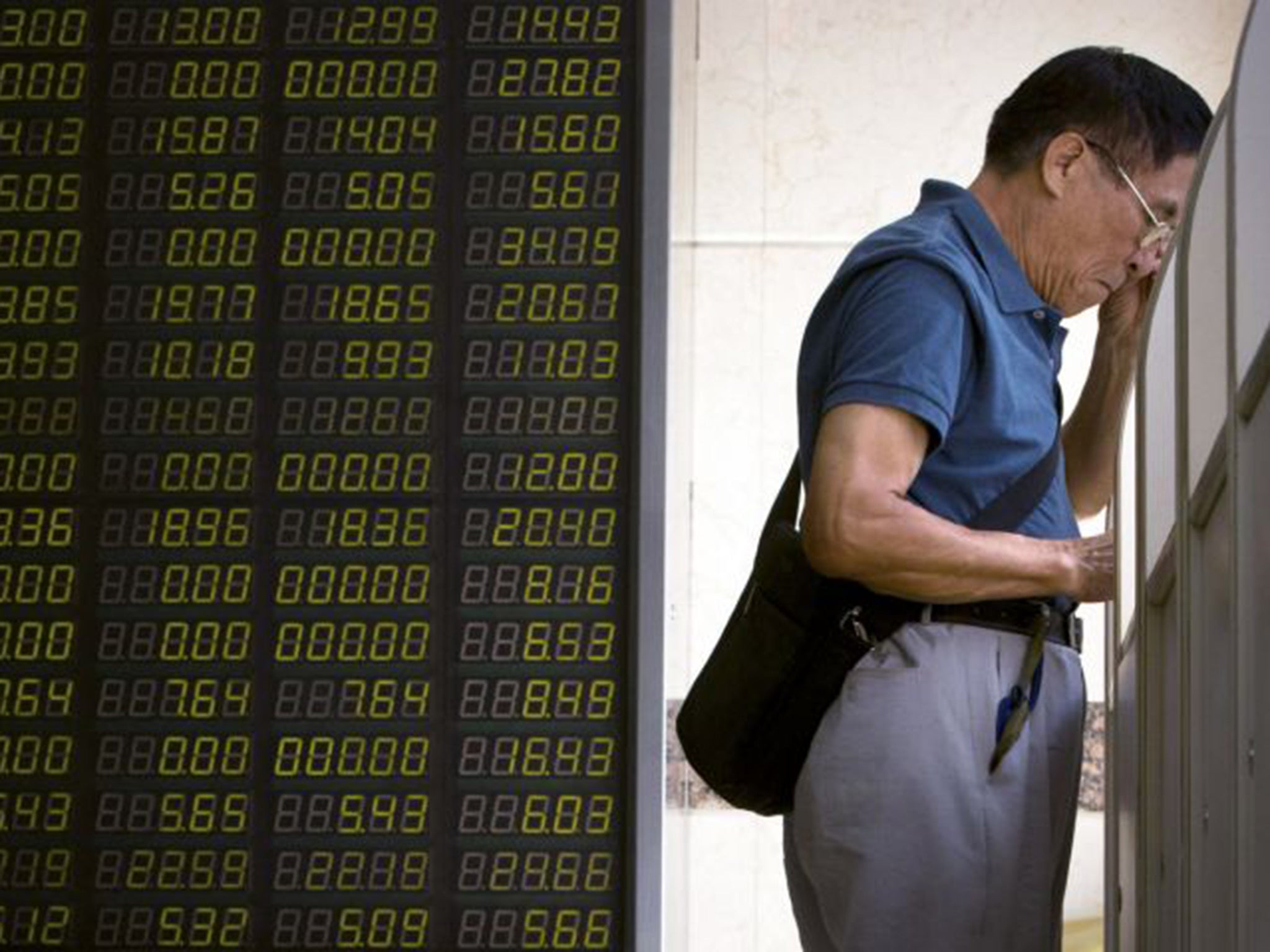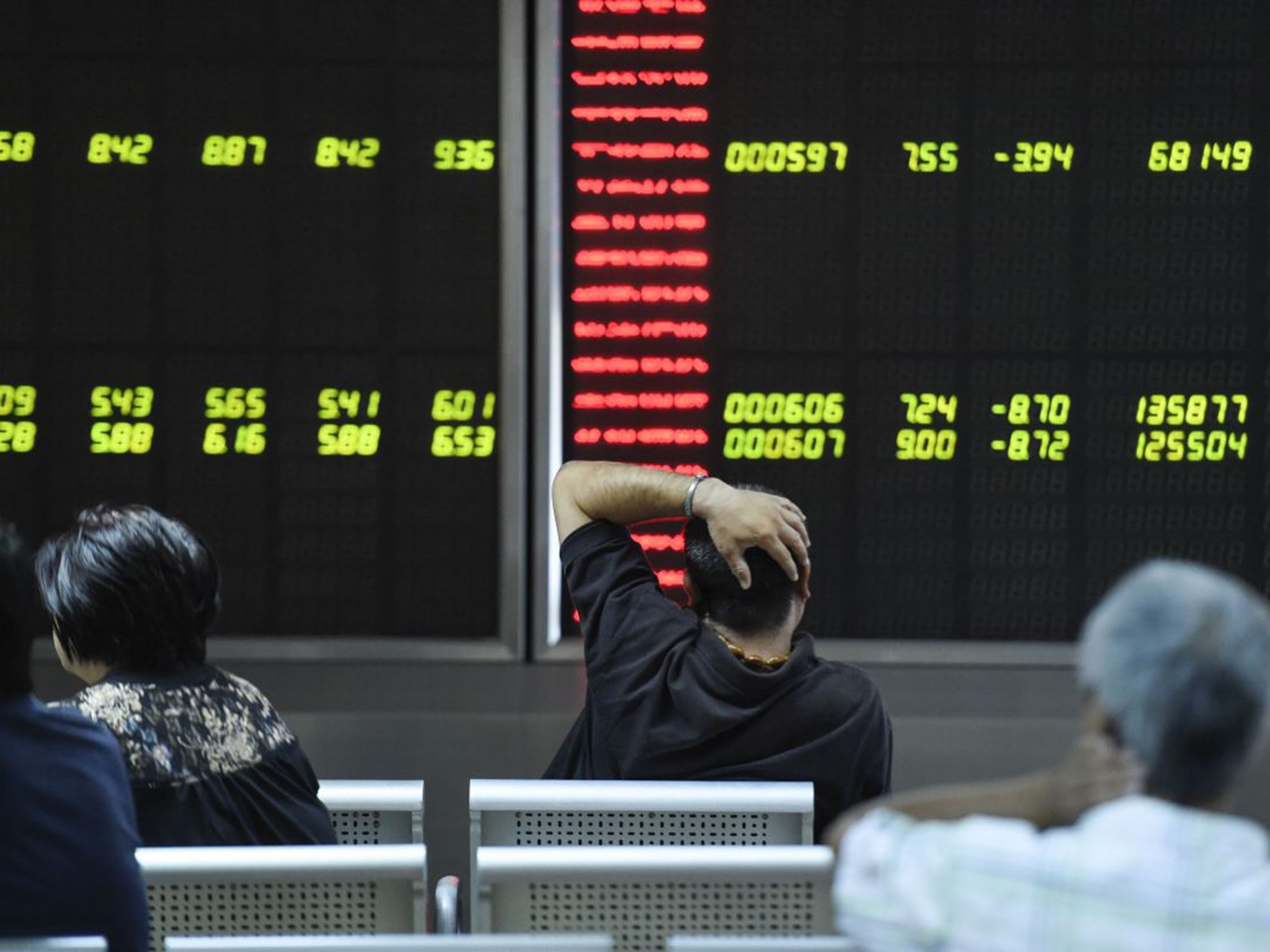China stock collapse: Why the country's market crash is not what it seems
Headlines about trillions of dollars being wiped off China's wealth assume that its stock market operates like ours, says Ben Chu. This is an illusion – and that's the Communist Party's problem

Your support helps us to tell the story
From reproductive rights to climate change to Big Tech, The Independent is on the ground when the story is developing. Whether it's investigating the financials of Elon Musk's pro-Trump PAC or producing our latest documentary, 'The A Word', which shines a light on the American women fighting for reproductive rights, we know how important it is to parse out the facts from the messaging.
At such a critical moment in US history, we need reporters on the ground. Your donation allows us to keep sending journalists to speak to both sides of the story.
The Independent is trusted by Americans across the entire political spectrum. And unlike many other quality news outlets, we choose not to lock Americans out of our reporting and analysis with paywalls. We believe quality journalism should be available to everyone, paid for by those who can afford it.
Your support makes all the difference.The eyes of the world swivelled to China this week as the country’s stock market crashed in spectacular fashion, with a number of economic myths about China being trotted out during the past five days of financial drama.
Donald Trump, the US presidential hopeful, responded to the market chaos in the Far East by arguing that America should now “decouple” from China. This is a quite ridiculous notion. China is woven into the fabric of the global economy, its workers are part of the supply chain of countless Western companies, and the Chinese state is the single largest owner of US government debt.
In addition, China’s economy provides the dragon’s share of demand for all of the world’s raw materials. The US – or the world – can no more “decouple” economically from China than Trump can decouple from his own ego.
Another myth (a less brainless one) is that China’s financial markets are akin to those of the West – and the effects of a mass sell-off are comparable. In some senses, it is actually worse in China. Buying and selling on Western stock markets is dominated by so-called institutional investors, the pension funds and insurance companies that invest on behalf of their clients. But 80 per cent of investors in Chinese shares are individuals who do the buying on their own behalf.

There have been tales in recent weeks of ordinary Chinese who have ploughed their life savings into the stock market only to see great chunks torn off by each fresh downward lurch of the Shanghai Composite Index. The scale of this has been somewhat overblown. Only about 6 per cent of Chinese households actually own stocks and shares. But it is true that there has been a considerable spike in speculation by ordinary Chinese over the past year.
How can they be so crazy? Yes, it’s a crazy way to manage your money. But China is a country whose “repressed” domestic financial system sometimes forces crazy choices on people. Most ordinary Chinese save a lot because the welfare state is threadbare. Public pensions are meagre and coverage is patchy. There is no national health service and healthcare can be cripplingly expensive, especially for the elderly; people feel they need a big cash buffer.
So where to stash all those savings? There is scant opportunity for most Chinese to move their money out of the country to get decent returns. In financial terms, China is still a largely closed country. The big four state-owned banks offer savings accounts, but the interest rate they pay is lower than the inflation rate. And, low as the savers’ interest rate is, it is higher than the rate at which these funds are lent out to businesses. This is a deliberate policy by the government to subside the corporate sector using the trapped savings of its population.
So savers can watch the value of their money eroded each day – or they can put it somewhere else where they can get semi-respectable returns. The property market is one popular outlet. Many middle-class Chinese own newly built (and fully furnished) properties that have never been lived in. But property prices have been sliding recently, tarnishing the allure of these “investment flats”. So, reckon some, why not the stock market? Yes, it’s a casino, but maybe it will pay out.

However, in other ways the impact of a Chinese equity collapse is less economically significant than it would be in the West. Most of China’s listed companies are majority state-owned. Imagine that three-quarters of the companies on the FTSE 100 were like Royal Bank of Scotland. The upshot is that the share price of Chinese firms is largely an irrelevance as far as their managements are concerned. They owe their position to their political connections, not to the approval of ordinary shareholders. And the stock-price falls have no impact on a firm’s ability to borrow. Those figures about trillions of dollars being wiped off Chinese wealth are in themselves something of a myth. Most of those losses are paper losses for the Chinese state, not losses borne by private households.
This is the bigger point about China that is so often missed by the rest of the world. China has copied outward forms of Western market economies – stock markets, limited companies, commercial banks – but often not the substance. The state retains a massive role in directing economic activity. By some calculations, half of the non-agricultural economy is still directly or indirectly in state hands.
China’s growth model since the global financial crisis has been simple. The Politburo tells local governments to deliver a local GDP growth target. Local governments commission construction companies to build new roads, ports, train stations and other infrastructure in order to hit that all-important growth target. And state-owned banks are commanded by the state to finance it all. That’s why the total level of debt in China’s economy has soared from 120 per cent of GDP in 2008 to more than 200 per cent now.
That is also why it is richly ironic to see small-state ideologues like George Osborne visiting China and fawning over Beijing’s economic management and growth rates. “I do think there’s an ambition in the country and a sense of optimism and ‘can do’ which our country had in the Victorian age and had at other points in our history,” the Chancellor burbled on a trip to the country two years ago, apparently unaware that China’s economy has been powered by disguised state spending and borrowing.

In fairness to Osborne, he was merely making the same mistake made by countless businessmen whose experience of the country is based on a few days in a five-star hotel in one of the big cities and whose knowledge of its economy rests on a perusal of a superficial magazine article about how China’s economy is inevitably going to “rule the world”.
So what was the real significance of this week’s China ructions? One hopes that the paranoid insecurity and sheer incompetence of the Chinese authorities has been exposed to a wider audience. A journalist, Wang Xiaolu, who suggested that government support for the stock market was coming to an end, was jailed. Attempts were made to censor social media mentions of the crash. These are the actions of tin-pot authoritarians, not omniscient economic planners.
Not everyone has caught up though. Martin Sorrell of the global advertising giant WPP insisted this week he still had confidence in the Chinese authorities because “they ain’t done too bad with a five-year planned economy since 1985”. But, as every investor is warned, past performance is no guarantee of future results. The crucial point to recognise is that the Chinese growth model based on these top-down “five-year plans” simply doesn’t work any more.
Wiser heads in Beijing know this well enough. The economy needs to pivot from investment-led growth to consumption-led growth if momentum is to be sustained. The state needs to correct its gross imbalances by curbing its interference in large sectors of the economy (such as technology and finance) – and to step forcefully into others (such as affordable housing and healthcare).
Ultimately, a choice needs to be made. The Politburo can allow the market to decide where economic resources go – or it can step in and pump up bank lending in order to target an arbitrary GDP growth rate. It can facilitate rebalancing by letting the Chinese currency float freely – or it can spend hundreds of billions of dollars of its accumulated foreign exchange reserves in order to fix the value of the yuan. It can’t do both.
The problem is that it increasingly looks as if the country’s dysfunctional and closed political system is standing in the way of China’s government from making a decisive choice in favour of reform. That block, not a plummeting stock market, is the essence of China’s economic crisis.
Ben Chu is the author of ‘Chinese Whispers: Why Everything You’ve Heard About China is Wrong’ (Weidenfeld & Nicolson)
Join our commenting forum
Join thought-provoking conversations, follow other Independent readers and see their replies
Comments